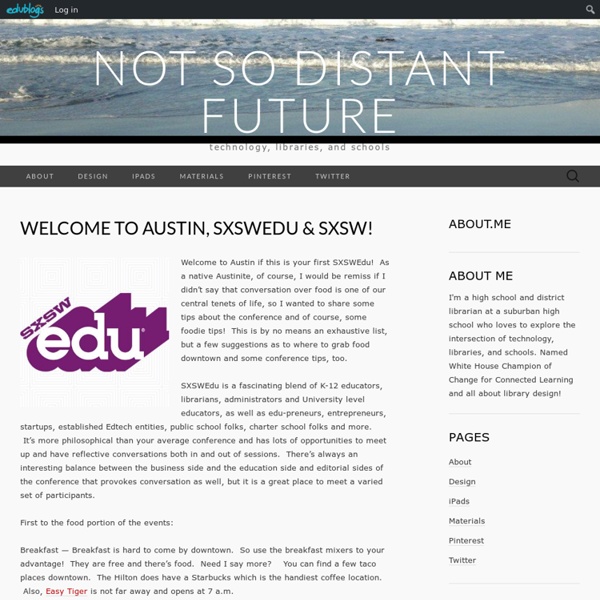



Kristin Fontichiaro's Blog About Learning, Teaching, Making Things, and Libraries Building professional capacityTeacher-librarians are well positioned to impart data literacy to teens, but who’s giving instructors the resources and support that they need to do so?Kristin Fontichiaro, clinical associate professor at University of Michigan’s School of Information, and Jo Angela Oehrli, learning librarian at University of Michigan Library, were up for the task. As principal investigators of the two-year IMLS-funded project “Supporting Librarians in Adding Data Literacy Skills to Information Literacy Instruction,” they set out to design materials for high school librarians looking to foster data and statistical literacy skills in their students.“We were seeing on our own campus that data was becoming a powerful mode of expression and wasn’t working in ways that information literacy always works,” says Fontichiaro.
Two Very Good Book Search Engines for Teachers May 11, 2015 In today’s post we are sharing with you two good platforms where you can search for and find online free and premium books. As for Free Book Search tool listed below , this is a specific search engine designed to help you find free ebooks, audiobooks, and Kindle books. This tool is also integrated with Google Drive allowing you to conduct your book search right in your Drive. Manifesto for 21st Century Teacher Librarians Editor’s Note: This article was originally published as a Tag Team Tech column on www.voyamagazine.com. It has been reprinted and reproduced numerous times and in many places. We are making it available here to ensure that all of our readers have seen it. Manifesto for 21st Century Teacher Librarians By Joyce Kasman Valenza
The School Library Media Specialist: Library Media Program: Introduction What is collection mapping? Collection mapping is the process of examining the quantity and quality of your collection and identifying its strengths and weaknesses. A number of authors have written about the process. Going Retro: Reading Apps for Real Books Reading Rainbow app YouTube clips. Texting. White Ravens Each year the language specialists (Lektoren) at the International Youth Library (IYL), in Munich, Germany, select newly published books from around the world that they consider to be especially noteworthy. This list of books is compiled into the annual White Ravens Catalogue, which is introduced each year at the Bologna (Italy) Children's Book Fair. The White Ravens Online Catalogue, which includes all titles from 1993 through 2007, was created by ICDL researchers in collaboration with the IYL and is available on the ICDL web site with the permission of the International Youth Library.
The School Library Media Specialist: Information Access & Delivery The teacher librarian sustains a healthy collection through an effective maintenance program. I hate to throw things away. How do I know when something should be pitched? 23 Great Library Blogs Let’s say that you are a school librarian, and let’s say you’ve decided that like many of the teachers in your school, you too are ready to use a blog to connect with parents and students, to share your latest news and events, or perhaps to develop your own personal learning network (PLN). You’re motivated and ready to begin, but you may have some lingering questions about the best way to get started and maybe you’re not entirely sure how to organize your new blog. Unfortunately, searching the internet for “how to create a great library blog” doesn’t yield many helpful answers. There are some sites that come up in that search that appear useful, but overall it seems to make more sense to just visit library blogs, see what works and what doesn’t, and craft your blog around the ideas you like the best. To make that process easier, we’ve compiled a list of library blogs on Edublogs. Library & Librarian Blogs